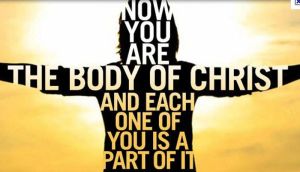In today’s First Reading Paul uses the relationship between husband and wife to explain the relationship between Christ and the Church, and sheds light on Christian marriage as well. Paul once again describes the Church as the Body of Christ, and evokes the passage of Genesis where it’s explained that when man and woman come together in marriage they become one flesh (see Genesis 2:24). Each spouse should love the other as his or her very self: in that logic there’s no room for abuse. Whoever is at fault, both are affected.
Some may see a disparity in the language between how the husband should act toward the wife and vice versa in Paul’s teaching, but their radical unity doesn’t exempt one or the other from total self-giving and dedication, whether in making decisions or accepting them. In that way they imitate Christ and how he loved the Church as if she were his own Body. We refer to the Church as “she” because she is the Spouse of Christ. Our relationship with Christ and our fellow believers in the Church should be the same: whether we are exercising authority or heeding it, we are doing so out of love.
Let’s ask Our Lord to help us imitate him more closely today in his loving dedication to us, and pray for every married couple to love their spouse as they’d love themselves.
Readings: Ephesians 5:21–33; Psalm 128:1–5; Luke 13:18–21. See also 30th Week in Ordinary Time, Tuesday, 11th Sunday in Ordinary Time, Cycle B and 17th Week in Ordinary Time, Monday.



